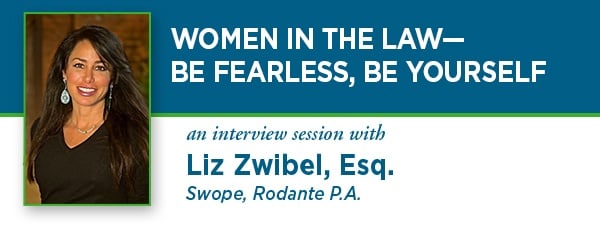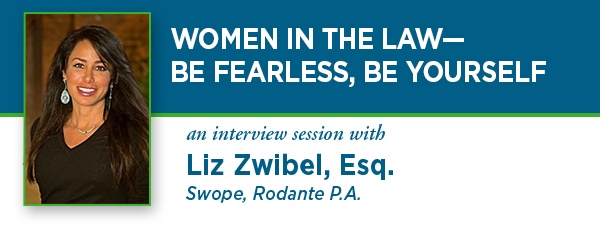Women in the Law—Be Fearless, Be Yourself
By: Elizabeth DiNardo, Esq. | Associate Counsel


Don’t be afraid to be who you are—a sentiment often promulgated among young people by teachers, parents and ad campaigns hoping to encourage confidence in one’s own skin. But sometimes that is easier said than done. As we get older and more experienced, we may consciously, or subconsciously, temper our personality to fit societal expectations, particularly in a professional setting. Women have an especially fine line to tread in the professional arena, most notably in male-dominated professions such as the law. When you meet a woman who stands out from the crowd and who is unapologetically herself, you can’t help but admire her for the trail she is blazing for all women in the legal industry.
In speaking with Elizabeth “Liz” Zwibel, an attorney at Swope, Rodante P.A., you begin to understand that women really can do anything. Liz had an unconventional start to her journey on her way to becoming a successful plaintiffs’ attorney. She didn’t harbor childhood dreams of being a lawyer and majored in broadcast journalism in college. But after a completing a Constitutional Law class during her senior year, a professor suggested she take the LSAT for admission to law school and she hasn’t looked back since. After graduating from George Mason University School of Law, Liz went to work at a defense firm in the D.C. metro area. “When you’re young—I was 24 at the time—you don’t really look beyond the specific case you’re working on and what your next task is. But as I got older and started to evolve as an attorney, I began to really see the people behind the claims and it started to really resonate.”
After several years working as a defense attorney, Liz began to realize that her passion tended more toward the plaintiff side of litigation. The true impetus for her transition from defense counsel to being an advocate for those without a voice came in the form of a particularly heartbreaking case involving a sick child. “I was midway through depositions for the defense in a case involving a severely disabled child who needed 24-hour care and suddenly the plaintiff (the child’s mother) started crying. I got back to my office after that deposition and thought to myself ‘Who am I doing this for? This is just a numbers game to the insurance company.’”
The image of that mother stayed with her and Ms. Zwibel soon thereafter made the decision to fight for the plaintiffs’ side, which she admits, has been more challenging and interesting than her previous defense work. “Whenever I get a good verdict, I feel immediate relief and happiness for the family of the plaintiff. My clients are all real people and I have the responsibility of making sure that they get the justice that they deserve.” When reflecting on what it means to be a female trial attorney, Liz comments that she feels there are certain advantages to being a woman in this male-dominated area of law. “I feel like women are natural storytellers, which certainly helps you when communicating with the jury.” She also points out that with so many trial attorneys being men, jurors tend to pay special attention when she presents her case because she breaks up the monotony of the ubiquitous image of “the man in a suit.”
While there are certainly advantages to being a female attorney in court, Liz insists that she has faced her fair share of sexism—from both her male counterparts and from other women. Her advice on how to handle this? Face it head on. “Don’t shrink back and let them win. Anyone who tries to make you feel uncomfortable for being a woman in a man’s world is just intimidated by you. That means you’re doing something right.”
Liz recounts a specific instance of blatant sexism during a noteworthy trial. Ms. Zwibel was representing a former computer engineer with top-secret government clearance as a programmer for the U.S. military. Her client had suffered a traumatic brain injury as a result of being attacked and was left with permanent brain damage and a neurological disorder. During trial, defense counsel called plaintiff’s expert to the stand and attempted to allude to an inappropriate meeting between Liz and the expert in an effort to distract the jury from the facts of the case. “Opposing counsel kept asking my expert where we had met to review the case and repeated the words ‘hotel room, hotel room, hotel room’ as if I had something to hide. I saw what he was doing so I walked up to the stand, looked right at the jury and asked ‘What was in that hotel room? Were we alone?’ The expert answered unequivocally ‘There was a conference table and no we were not alone.’” Liz Zwibel isn’t the sort of woman to let anyone push her into a proverbial corner. She and her co-counsel went on to win a $28.5 million verdict for their client in that case.
Liz exudes an aura of optimism and confidence. She makes assurances that things have definitely improved for women in the legal profession since she first entered the field. She attributes the shift to more women becoming attorneys and recognizing that we are stronger as a supportive community for each other. When asked if she anticipates an influx in the number of female trial lawyers, she speculates that in order for that to occur, there needs to be a shift in how society views traditional gender roles. “At the moment, there is still very much the expectation that women should be the nurturer and the primary parent. That’s hard when you’re a trial attorney because every case is your baby. In the past, a lot of young women weren’t going into litigation because it doesn’t involve a lot of balance—you need to have a real support system at home. Traditionally, men didn’t need to think about that balance as much as women did.”
Like many of the women we’ve interviewed, Liz maintains that the way forward for women in the legal industry is through mentorship and the continued formation of a community. “The legal industry isn’t perfect. Women need to know that unfortunately there is still sexism out there but you can beat it. You have to outwork your opponent and know your case inside and out. Remember how far women have come in the last few decades. We are fearless and that’s our best weapon—a lot of men don’t know just how fearless women can be.”
Counsel Financial provides working capital credit lines exclusively for the plaintiffs' bar in all states except California, where credit lines are issued by California Attorney Lending.




